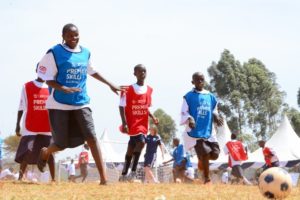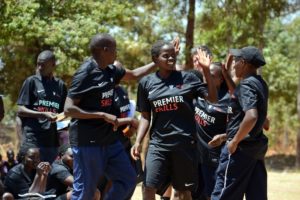Over the years, there has been steadily growing interest in the idea that sport can make a difference in development, beyond the obvious benefits to health and wellbeing. Worldwide, hundreds of organisations from the English Premier League to the United Nations are using the power of sport to build peace, reintegrate child soldiers, support survivors of disasters, and promote gender equality.

But does it work? Itad had an exciting opportunity to contribute to the evidence base through a recent evaluation of a £1.7 million, three-year pilot programme in Western Kenya (Mount Elgon and Kisumu), funded by the British Council and the Department for International Development (DFID). Known locally as Kenya Timz, the programme aimed to use football to reduce tragically high rates of violence against women and girls in the region. The programme worked with young people and their communities to challenge attitudes and behaviours that support violence and inequality. The final report is available here, including a four-page executive summary for anyone short of time. We have also packaged up various monitoring tools we used to measure change in attitudes and behaviours over time, for the use of other organisations working in the sector. Here are three headlines:
- Football proved a powerful entry point to communities – but it is no magic bullet. Football acted as a persuasive ‘hook’ to recruit 4500 young people into the programme, half of them boys. This is crucial because violence against women and girls cannot be ended without engaging men and boys, and it is essential to find ways to engage them in dialogue. Recruiting and training football coaches from within the communities created role models and gender advocates, in many cases changing the way they thought and talked about gender and violence, and empowering them to become community champions. Football can be an excellent, relatively low resource entry point to communities, in cultures where it is a national and much-loved sport. It requires relatively few resources, as a lot of the social and physical infrastructure is already there (pitches, coaches, teams) – providing instant avenues for recruiting coaches and participants. Football can also make a thematic curriculum more engaging and interesting. The programme adapted its approach over time, increasingly using games and activities on the pitch to teach key messages and encourage young people to think about gender and violence. However, football is no magic bullet. It was only one component in a broader suite of project activities, alongside thematic educational activities, community advocacy, and engagement with politicians, police, health care professionals and teachers, all of which were important to promote community-level change. It is also important to manage community expectations when using football as a vehicle for social change – many community members initially expected Kenya Timz to build state-of-the-art football pitches and help turn their promising players into stars.
- Kenya Timz reached thousands of young people and helped change their minds about the acceptability of violence in their communities. Girls and boys spent several months playing football and learning about violence, gender and their rights through interactive sessions with community coaches. We found that the programme increased their knowledge and awareness about violence and built their confidence, self-esteem and life skills. It also changed (self-reported) attitudes around gender and the acceptability of violence. Almost half the young people agreed at the start of the programme that ‘there are times when a woman deserves to be beaten’ – this had reduced to 12% at the end. But there have been challenges. In the quest to reach as many young people as possible, the programme recruited most of its participants through primary schools. This succeeding in getting high numbers of in-school youths to sign up, but young people who had dropped out of school didn’t want to come to sessions in the school grounds, young mothers couldn’t attend without support with childcare, and the pitches were inaccessible for youth with disabilities. A new approach was introduced halfway through the programme to reach some these groups, which was successful but resource intensive and reached much smaller numbers – pointing to an important trade-off between reach and inclusion.
- The programme started rich conversations – but ultimately was too short to make much of a dent in harmful attitudes or levels of violence at a community level. It is all very well to change the minds of young people, but they are hugely influenced by their parents and other adults in their lives. Without engaging the whole community, there is little hope of shifting social norms that sustain violence or changing people’s behaviour in the longer term. Recognising this, the programme worked strategically with local government, police, health care workers and other ‘duty bearers’, providing targeted support to help improve local approaches to addressing violence – and had several successes in influencing policy and

Kenya Timz coaches during a training session (© British Council) practice. The programme also reached around 12,000 adult community members through football tournaments and other advocacy events, which succeeded in facilitating deep conversations about violence and the role of men and women in society; conversations many people had never had before. But while several people told us the programme had changed their minds about the acceptability of violence or had even stopped them from being violent towards their girlfriends or wives, this evidence was largely anecdotal. Our survey found that inequitable attitudes are still widespread among adults in both communities. We also found limited evidence that the programme had helped reduce violence (although in Mount Elgon there was more consistent evidence that cases of sexual violence had reduced – an important finding but one that needs to be interpreted with caution given measurement challenges). The evaluation highlights the role that poverty and limited economic opportunities play in putting girls and women at risk and preventing them from escaping violent situations; issues which were beyond the scope of this programme to address.
Crucially, our findings highlight the importance of sustained, long-term engagement in order to shift social norms and reduce violence against women and girls. DFID decided not to continue funding Kenya Timz, and the programme has now closed. Many community members were disappointed that what was considered a successful pilot was not being continued, and unfortunately, it isn’t clear how sustainable the programme’s activities will be in the longer term. In the words of one programme team member: “Three years was not long enough for working on such a sensitive area. It’s hard to break down these barriers… you need to understand the community before you can have any sort of tangible impact. I don’t think it’s been able to happen through this period.”
So what should others interested in using football to tackle violence against women and girls do in future? Our evaluation suggests they should: identify a sport that has broad popularity which can provide entry point into communities; carefully recruit and continue to support community coaches (recognising that they are likely to hold some of the attitudes the programme wants to change); integrate sport closely with thematic content; consider strategic and targeted engagement with duty bearers through existing forums; and invest up front in community sensitisation from the start. Finally, other programmes interested in this sort of approach should integrate sustainability considerations from the very beginning. If we want to shift deeply rooted practices such as violence against women and girls, we need to commit to long-term engagement. Otherwise, the risk is that short-term successes will simply be reversed when the programme ends.


